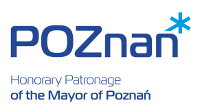PLM2016 Thematic session: Embodiment in cross-linguistic studies: The body part term ‘head’
Convener: Iwona Kraska-Szlenk (University of Warsaw)
The contact person for this thematic session is Iwona Kraska-Szlenk (e-mail: i.kraska@uw.edu.pl).
We invite submission of abstracts for a one-day workshop session to be held at 46th Poznań Linguistic Meeting. Each paper will be given 30 minutes, including 10 minutes for discussion.
The workshop will contribute to research on the connection between language and the human body which has been extensively investigated in cognitive sciences under the cover-term of “embodiment”. One of the major tenets of the theory claims that the body provides a prolific source domain in conceptualization of various concrete and abstract notions. This can be observed in the case of body part terms which easily extend onto other domains by means of metaphor or metonymy. Such transfers are found in all languages, because major body part terms belong to a basic lexicon and tend to have high frequency of use and rich polysemy. Semantic extensions share a number of cross-linguistic tendencies, but also show culture-specific conventionalization. For these reasons, the lexicon of body part terms constitutes an interesting research area for typological studies on embodiment, but also for investigation of more general issues, such as regularity of semantic change and cognitive universals, as well as problems of language-culture connection. The workshop aims at a close examination of a chosen body part term – ‘head’ – from the comparative perspective of many unrelated, geographically distant and culturally differentiated languages. Using the example of this lexeme, we will discuss various semantic, morphological and syntactic aspects of body part terms, including:
• polysemy and domains of semantic extension
• usage patterns of constructed senses
• grammaticalization processes
• corpus studies of various issues (e.g. frequency, collocations)
• compounding and noun incorporation
• “special” syntax (e.g. inalienable possession, use of pronouns)
• lexicalization and diachronic change
• morphological derivatives and semantic autonomy
• language-culture issues and idiomatic constructions
We welcome papers on any of the above and related issues, whether focused on one specific language or comparative studies. The workshop will end with a discussion summarizing preliminary results as to cross-linguistic tendencies and cultural differences among languages.
The abstract submission deadline for this session is extended until March 31, 2016. Other details of abstract submission are available here.
